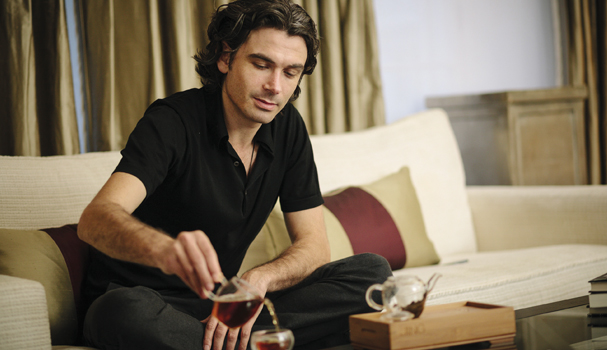First consumed in China at least 3,000 years ago, tea has had an incredibly rich heritage, acting as the focus for ceremony, ritual tribute and the interdependence of microcosmic and macrocosmic phenomena of the universe. By contrast, Britain’s typical approach to hot beverages is distinctly unceremonious, with Rich Tea biscuits considered more integral than ritual.
Therefore, one might wonder what led Edward Eisler, founder of JING, importers of high quality teas and ancient tea culture, to look beyond the basic cup of builder’s to its roots. “Tea has been an incredible focus for me because it transcends culture,” he says. After water, it is the second most commonly consumed beverage on Earth, meaning there is something universal about the popular brew. Eisler adds: “The joy of tea has manifested in varied styles in so many different cultures and countries around the world.”
His first taste of the ancient traditions that have been an intimate part of the plant’s history actually came at the tender age of 15. “I was in Prague and I went to a wonderful tea house that really gave that experience of traditional tea culture,” he explains. “It was the seeding moment.”
Only a couple of years later Eisler took the first of many trips he would make to China. “What I loved about it was the tea culture,” he says. And over the course of the following years, he spent a great deal of time of imbibing the country’s traditions. Training under one of the world’s great masters, Eisler eventually became an instructor of the martial art Wing Chun. He also obtained a degree in Chinese medicine, something he feels was invaluable for gauging the tenor of its culture.
“Chinese medicine gave me a really deep understanding of Chinese thinking,” he explains. “When you can talk to someone on that level and there’s that resonance in the relationship, it really helps understand the deeper levels and inner values that actually had attracted me in the first place.”
But, of course, the nucleus of his time in east Asia was focused on its beverages, specifically the traditions sparked by Gongfu tea ceremonies. Gongfu – the root of the less accurately anglicised ‘kung fu’ – is something Eisler would equate to meaning ‘accomplishment through practice and understanding through effort’. He explains: “Gongfu is the work to actually bring an amazing tea experience to yourself and whoever you want to share it with.”
Clearly then, any entrepreneur wanting to truly understand tea and the traditions behind it would need to put in some real work, rather than simply relying on some rudimentary research. Fortunately, Eisler wasn’t scared of doing the legwork. “I became a master tea taster,” Eisler says. “I learned about how to make tea, to prepare it very well. I learnt how to design and produce tea-ware that lends itself to really enjoyable use, beauty and fantastic tasting tea.”

This pursuit of artistry is something he felt has always been lacking in the British approach to tea, in part influenced by the way we have always seen it more as a commodity than an experience. But this is something that is changing significantly, driven by a reaction to the cluttered lives we now lead. “Our lives are so filled with stuff,” Eisler comments. “We don’t get a moment, a gap. People are crying out for experience.”
It’s a contradiction of our modern age that we both constantly crave stimulation and yet feel the need for respite. “Tea is fulfilling that need because of what it has always meant to people,” Eisler says. The beverage is very appropriate for dealing with the fatigue. Chemically it both stimulates and relaxes. “But it’s actually the experience and the process of making it, that ritual, however simple it may be, that actually helps us to focus our minds.”
And, in the Gongfu tradition, experience is key to the fundamental essence of tea, something that had a huge influence on the creation of JING. “Jīng means ‘essence’,” he says. “What I wanted to do was go back to the inner values of ancient tea, the jīng of it.”
Exporting an entire tradition may have been a rather tall order for someone with less of a handle on the intricacies of the product. “In China, there are at least 10,000 teas and, in certain provinces, you’ve got more than 100 really distinct tastes,” Eisler explains.
Variations in how long the tea is withered, the degree of oxidisation it goes through and the stage at which it is fired mean that understanding the nature of the tea you are buying can sometimes be hard to gauge. Eisler continues: “But when you know about this stuff and you know what you want, you can work with a producer to great effect.”
However, in attempting to introduce a more rarified tea drinking culture to a country that has long focused on expedience over experience, JING required some friends in high places. “We needed people that would really value what we were offering, the quality and the meaning of the experience,” Eisler says. Enter Heston Blumenthal.
“He asked me to come and create a tea experience for the Fat Duck, which had just won best restaurant in the world a few months before,” Eisler recalls. Creating a tea ceremony in partnership with a high profile eatery known for offering experiences outside the norm meant it wasn’t long before other Michelin-starred restaurants began to follow suit. “Now we work with up to 50 of the top food and beverage leaders in the world.”
There was also another sector in which JING would find an audience eager to encounter new things. “We knew top hotels would really care about the experience,” says Eisler. Providing their guests with a much more meditative connection to a familiar relaxing drink fitted effectively with the services these outlets were providing. “It brought it to the individual who was travelling hard but wanted to feel well and have an experience.”
Despite this, JING isn’t only an out of home brand. The best way for it to form a direct and long-term relationship with consumers was by bringing its teas and tea-ware right to them. “Tea is such a great online product,” Eisler says. “It’s light, it’s easy to transport, it doesn’t need to be chilled.” This has helped JING bring the essence of ancient tea traditions to an international audience.

But given JING’s global presence, how has its approach been received in the countries where these traditions first began?
According to Eisler, very positively. The example he gives is Japan, where it would be very difficult to launch a high-end product without a sincere commitment to quality. “They really appreciate the inner value of things,” he says. This meant as a country it had a very high barrier to entry, particularly given it was an approach to the product with which it was intimately familiar. “But the quality of our tea has been extraordinarily well-received,” he explains. “The feedback we’ve had there has been wonderfully encouraging.”
Yet an overwhelmingly warm reception does not mean JING can afford to rest on its laurels. “The really mass market high-volume tea is really prevalent and growing in emerging markets,” Eisler says. “In a sense, we’re the counter-culture.”
Despite this, he hints that there are some significant things in the offing for JING that should prove exciting for those interested in the deeper values of the humble herb. In the meantime, the focus is on spreading the spark that first attracted Eisler to the traditional approach to tea. He concludes: “The vision for us is bringing the Gongfu tea tradition – and all that it promises in terms of taste, quality and experience – to the world.” ![]()
Share via:


















































